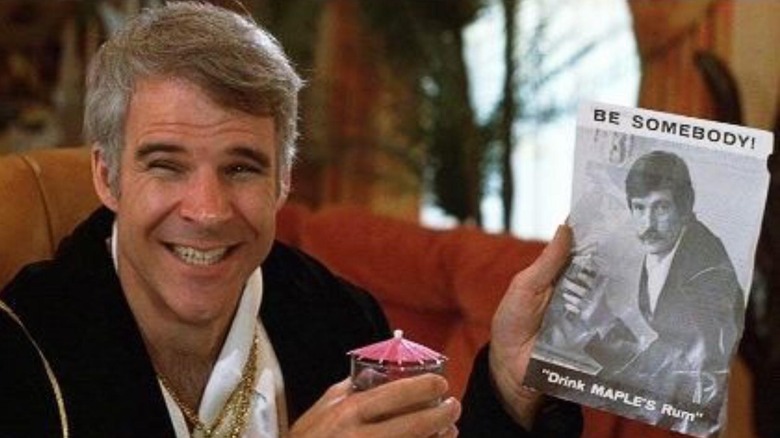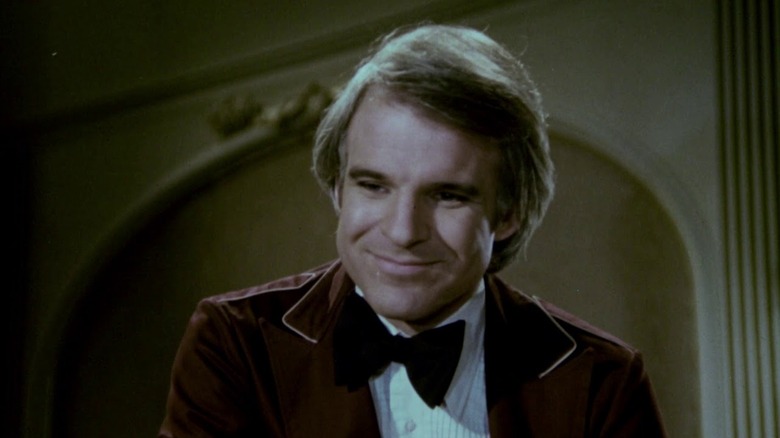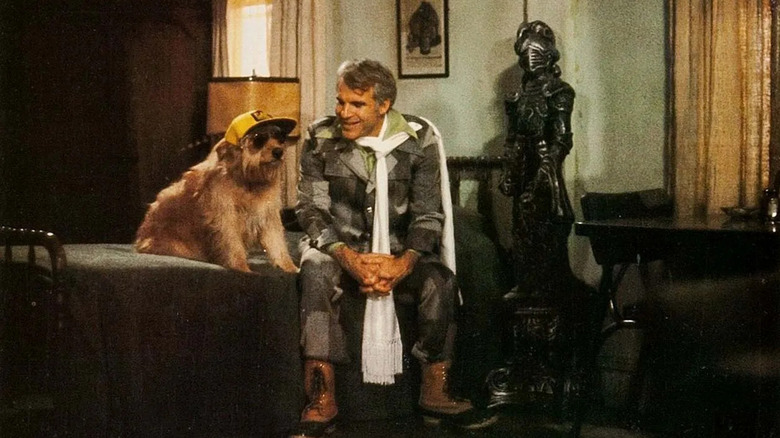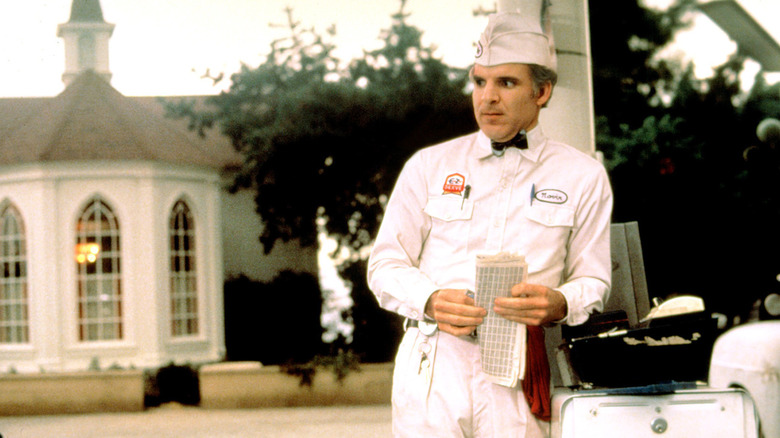Steve Martin's Name Wasn't Enough To Sell Paramount On The Jerk
There are some people who were clearly born to be movie stars, whose combination of looks, charisma, and talent are just undeniable. Steve Martin is one of them. His '30s-matinee-idol meets playful-imp face combined with his comedic sensibilities being both anarchic and intelligent is a combination so dynamite, it's almost like he was destined to be on screen.
Yet the man whose career has spanned several decades, up to and including his current well-received Hulu series "Only Murders in the Building," was at one time considered not bankable enough to matter to executives at Paramount Pictures. The studio was where Martin and his collaborators (primarily co-writer Carl Gottlieb) developed what would become Martin's feature film debut, 1979's "The Jerk." In a quirk of the movie industry commonly known as "stupidity," Paramount executives decided not to shepherd Martin to the big screen, instead giving Universal the chance to receive box office success, make a watershed comedy classic, and birth a new movie star in Steve Martin.
The proof-of-concept 'Waiter'
Before he made the leap to the big screen, Steve Martin was already a hit with his stand-up comedy act. According to a 2019 oral history of "The Jerk" on Consequence of Sound, Martin was playing a sold-out show in 1977 that was attended by Paramount executive David Picker, and the raucous response to his act from the crowd convinced Picker to offer Martin a two-picture deal at the studio.
To be fair, the initially slow writing process for what would become "The Jerk" didn't exactly endear Martin and Gottlieb to the Paramount higher-ups. As Gottlieb recalled, "There was no idea. We sat there everyday. We had a nice little office in the writers building right on the Paramount lot with a couple new pencils and yellow pads and we'd go into work every morning and look at each other and say 'Well, what about...' And then a couple of weeks went by and we didn't have anything."
Coming up with a concept for a film was one hurdle Martin and Gottlieb had to climb — the other was Martin's untested status as a movie actor. To that end, the duo put together a 7-minute short entitled "The Absent-Minded Waiter," a film that would double as both a screen test and cinematic calling card for Martin. As Gottlieb explained:
"Steve was still an unknown quantity on film, and that was the reason for 'The Absent Minded Waiter' short, which I directed, and starred Buck Henry and Teri Garr. The theory, and this was really good thinking by David Picker, was 'We do it as a short, we attach it to one of our big pictures, we give it to our exhibitors for nothing. But the film audience gets to see Steve Martin on the big screen and they will see his star quality and that will build an audience for him.'"
'Well I'm gonna go, then! And I don't need any of this! ... I don't need anything! Except this'
"The Absent-Minded Waiter" exceeded everyone's expectations, proving that Martin was just as dynamic on screen as on stage and getting nominated for a Best Short Film Academy Award to boot. Gottlieb and Martin managed to finally work up an idea for a feature, too, initially calling the film "Easy Money."
Unfortunately, their success and progress came at a bad time, when the studio brass changed hands. As Gottlieb recalled:
"We had a first draft that was pretty good. We're working away, and we write a first draft. And in the meantime, Paramount has a change of regime and Barry Diller and Mike Eisner are brought over from ABC to be in charge of production at Paramount. Like what usually happens in Hollywood when a new team comes in, they scrap all the old projects and they want to develop their own slate, so they get credit for it. So, they kind of decided that they didn't want to be in the Steve Martin business."
Thankfully, Martin and his team were shrewd enough to salvage all the good work they'd done while at Paramount. Gottlieb continued, saying:
"Steve's management went to Paramount and said, 'Look, you owe us for two movies. Whether you want to release a Steve Martin movie or not, you owe us for another screenplay after this one. So, tell you what we'll do. You give us 'Absent Minded Waiter,' free and clear, for our own use, and we'll take the script, pitch it some place else, and you can make whatever movies you want without us.' And Paramount said, 'Okay.'"
'Things are going to start happening to me now'
After leaving Paramount, Martin was able to set up shop at Universal. Unfortunately, the move meant Gottlieb couldn't be involved in the rewrite of the film (with Martin's old writing pal Michael Elias taking over co-writing duties) and couldn't direct the film as he'd originally wished to. As he explained, "Had we stayed on track at Paramount, I probably would have directed it. But it would've been a substantially different movie."
"The Jerk" ended up finding the best director for the movie it became in Carl Reiner, who by the late '70s was already a comedy legend. Reiner and Martin hit it off so well while making the film, in fact, that it marked the beginning of a remarkable collaboration. As Reiner observed, "Once we did this film together, we did three after that, so you realize we were on the same page every day and we understood each other and it just flew out of us."
Upon its release, "The Jerk" proved beyond a shadow of a doubt that Steve Martin was bound to become a legend himself, on-screen as well as on stage. Though "the reviews were mixed," as Elias recalled, the movie ultimately worked because it "was Steve's act in a way, which was also groundbreaking and anarchistic and bent all the rules and reflected on itself and parodied other things."
The film also showed that Martin could be counted on for box office returns as well as laughs, as Gottlieb observed: "It did so well for its time, and it cost so little to produce, that it was a huge success for everybody." After all, according to Martin, no less than Stanley Kubrick professed his love for the film. Given all this success and praise, it makes the old regime at Paramount who passed on the film look even more like ... well, real jerks.



